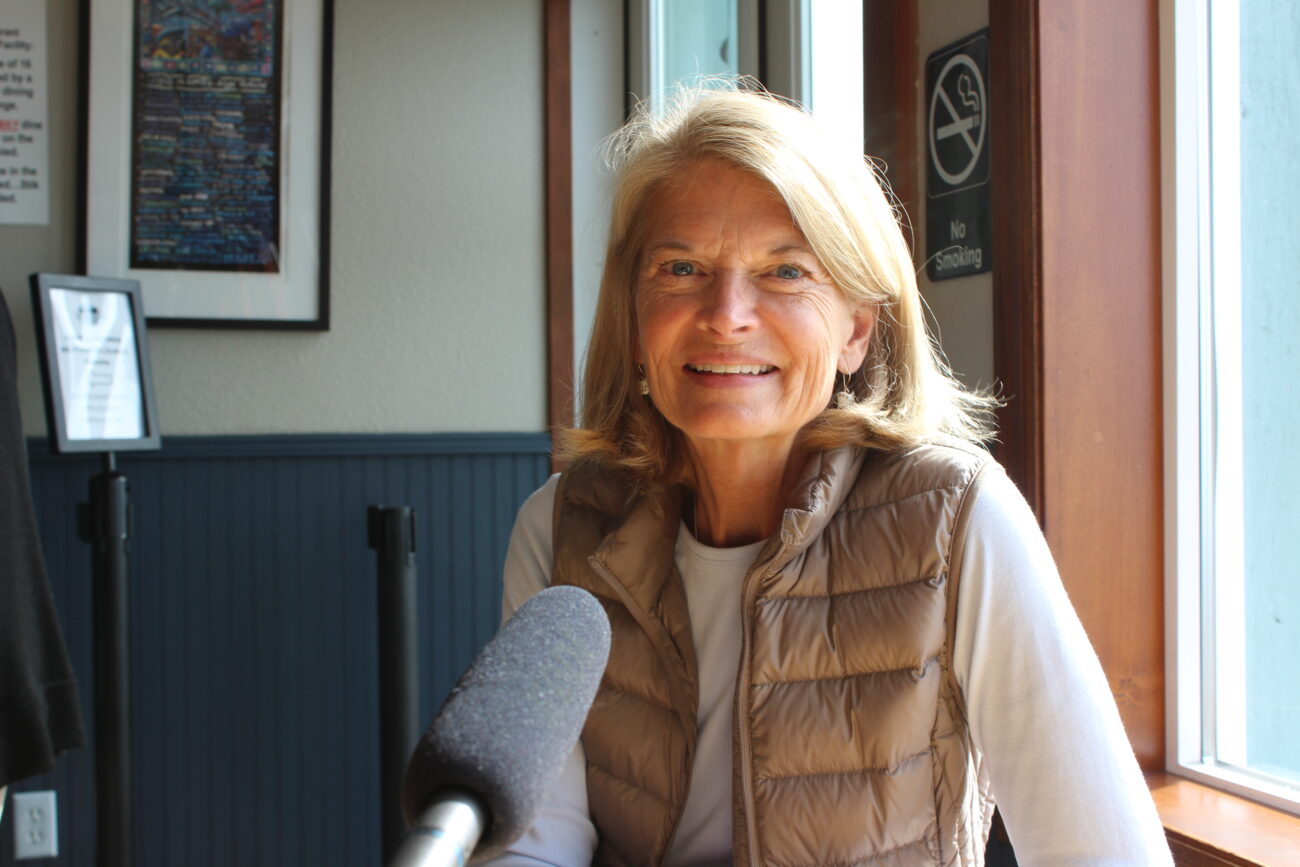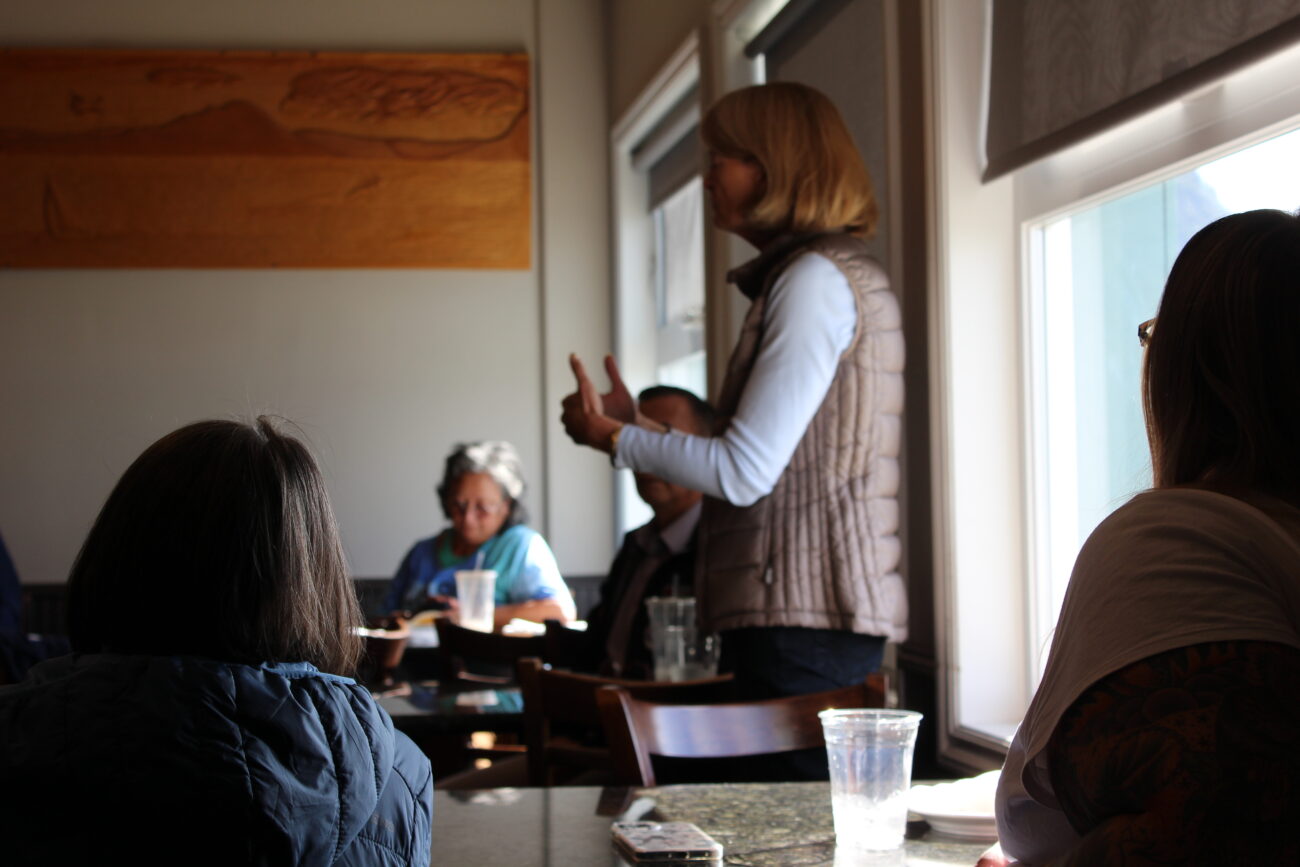
(Sage Smiley / KSTK)
U.S. Senator Lisa Murkowski (R-AK) has served as one of Alaska’s two senators for almost a decade, and is campaigning for another six-year term.
Murkowski stopped in Wrangell Sunday (September 11) and after a public meet-and-greet sat down with KSTK’s Sage Smiley at the Stikine Inn to discuss local and national issues. She talked about the inclusion of Wrangell’s Native community in the Alaska Native Claims Settlement Act, the push for a Bureau of Indian Education Boarding School Truth & Healing Commission, and bipartisan reproductive freedom legislation that she sponsored, among other issues.
KSTK (Sage Smiley): So to start things off, you have just made it through the first round of the first ranked-choice general election [the primary], does that change anything about how you’re approaching campaigning or maintaining the office?
SENATOR LISA MURKOWSKI: Well, we have just come through the primary, and it was different because it was an open primary. So if Alaskans will recall, there were a lot of names that they looked at when they saw the section for “United States Senate.” For me, as I approached this election, it was with a goal to November and how to how to reach out to the communities, to the constituents, to the different sectors, really in a very, very broad way, which is not unusual for me because that’s how I that’s how I approach policymaking is trying to build as broad constituency and broad of support as I possibly can. So, for me, it’s actually been very, very familiar in terms of a campaign. I’ve been everywhere, in big cities and small communities; I was in Tenakee Springs yesterday, I’m here in Wrangell today. I was in Haines and Skagway, I traveled by ferry so that I was making sure that I’m talking to people where they are. The week before that I was in Craig, Klawock, Metlakatla, Ketchikan. Prior to that I was in Kodiak and Unalaska, Palmer and Kotzebue. So it’s been big towns, little towns, Southwest Alaska, Southeast Alaska – all over. And it’s been fabulous, really.

(Sage Smiley / KSTK)
KSTK: So what sorts of things are you hearing from people statewide, but then also, are there specific repeated messages you’re getting from people in Southeast?
MURKOWSKI: Yes. Well, let’s talk statewide first, because some of the some of the things that I’m hearing in every community is: housing, housing, housing. I’m also hearing about workforce shortages: ‘We can’t find people to work.’ Here in Southeast we’re still in the midst of the tourism season, and [the shortage has] been hard on people – they welcome the fact that we were able to get cruise ships back up, that’s great to get the visitors here – but you can’t find people to work at the little coffee shops. So, workforce has been an issue. Childcare, access to childcare has been [repeated] and that kind of ties in: how much of a workforce holdback are we seeing because people can’t find a place to put their children as they seek employment? So those are a lot of the common themes that I’ve heard around the state. Here in Southeast: Alaska Marine Highway System, over and over and over again. Because when you don’t have reliable, affordable ferry service, what does that mean to our communities? Everything from the cost of goods at the grocery store, to the ability of kids to to be able to travel. I came down from Juneau yesterday, I was flying on Alaska Airlines, and I swear half the airplane were kids from the cross-country meet there in Petersburg, and they’re all flying because there’s no ferry. And I asked: ‘What does this do to your travel budget?’ And they’re like, ‘Well, this is it.’ Those are real things for communities like this. So [the] Marine Highway System, and just the cost of living here in Southeast.
KSTK: So with the marine highway, it might be a little more obvious how a federal representative can help with that – with federal transportation dollars directed towards the marine highway – but with some of those other issues, how do you as a senator approach helping with a housing issue in a small place like Wrangell, for example?
MURKOWSKI: Well, one of the things that I’m going to be doing this afternoon is trying to understand the infrastructure needs here in this city, in this community. Because if you have water and wastewater issues, we can talk about: ‘Well, we’re going to build more housing,’ but if you’ve got a development that is going to struggle to be cost-competitive, because we can’t get utilities out to it. Let’s talk and understand what that really means. So for what I can do at the federal side to help with something that is as local as housing, it’s a lot of the associated infrastructure. Think about it: if you’re making a decision as to whether or not you want to come and live and work and raise your family in Wrangell, you want to have decent housing, you want to have a good school, you want to be able to get in and out, you want to have a level of affordability, you want to have a level of health care. So it’s really a very holistic picture. And there’s so much that we can do to support in different ways. The federal government is not going to build your house. But what we can do is we can help the community [with] the architecture, the bones of the community, that allow the community then to prosper. So this infrastructure bill that we passed into law that I’m very, very proud of the work that we have done, I think the community is really going to start seeing the benefits pay off. We’ve already got funding to the airport here – a million bucks – but you’re gonna see everything from broadband to water and wastewater support. You know, you’ve got some great little harbors here in Wrangell, but what more what more can we be doing on the infrastructure side?
KSTK: And one of your more recent appropriations was about $2 million for a bypass since we have bad dams for our water reservoirs.
MURKOWSKI: Mm-hmm.
KSTK: You mentioned being in Tenakee recently, and that is one of the five “landless communities” here in Southeast Alaska. Could you tell me a bit about where that process of including Wrangell and the other four other communities into ANCSA [the Alaska Native Claims Settlement Act] is?
MURKOWSKI: Yeah, I had introduced legislation some months ago at the request of the landless communities, something that has been pending for decades and decades and outstanding inequity, post-ANCSA. And so it’s hard – it’s hard because every acre in the Tongass is already committed or loved in some way. But just because it’s hard, doesn’t mean that we should not honor the obligation of the Native Claims Settlement Act. And so it’s important. It’s hard, though, and I recognize that, so I’ve tried to bring about as much consensus as we possibly can. The one community that I had not had an opportunity to visit and to sit directly with the people there was Tenakee. So I told the mayor: ‘I need to come out and I need to hear you, I need to hear your views and perspectives.’ So I’ve done that. Where we go next: the bill is pending before the Senate Energy and Natural Resources Committee, on which I sit. I don’t know if we’re going to have markup – where we would have an opportunity to raise that again, in this next month. That’s going to be business when I get back to D.C. tomorrow. But what we’re trying to do, again, is to resolve a long-standing inequity and do so in a manner that brings about consensus rather than conflict.
KSTK: Definitely. Another Wrangell issue that has been discussed a lot within the last few days, with the Sharing Our Knowledge conference that was here.
MURKOWSKI: I was so sorry I missed it, I hear it was fabulous.
KSTK: It was incredible. But there was much discussion of the [proposed national] Truth and Healing Commission in concert with the Wrangell Institute, [and] the healing ceremony that was able to happen here. And I’m wondering if you might be able to tell me a bit about where that is in process?
MURKOWSKI: Well, this is something that Secretary Haaland and Department of Interior has taken very personally and very directly. So we’ve got a lot of help from Interior on this. Our legislation that we had introduced has already gone through – Well, we had a hearing in committee, it was very, very powerful. And so I think where we are, is: we’re continuing to to raise the profile, raise the awareness, but I think you have a push from others [and] I feel relatively confident that we are going to be moving in a way and a manner that will help to bring about the healing that for for decades now that has been an open wound for so many. And so the first step is raising this awareness and then the healing that will follow.
KSTK: Absolutely. I know that this was a cause more championed by Representative Young but also something that concerns a lot of people here are state and federal fisheries issues. Of course, you are less involved at the state level, that is not your purview. But in terms of federal fisheries issues, is there anything you’re looking at in terms of – I know that there is proposed Magnuson Stevens Act reauthorization? What are you thinking about when looking at fisheries, especially considering that the newly elected representative [Mary Peltola] to fill out the late Rep. Young’s term, one of her champion issues is bycatch in federal fisheries?
MURKOWSKI: I’m looking very much forward to the leadership that Representative-elect Peltola can bring to the fisheries issues. This is something that is personal to her coming from the Bethel region that she does, but also, with her work on the Intertribal Fisheries Commission. Senator [Dan] Sullivan and I have a pretty good working plan, in terms of how we address these issues that are so important to our state, like the fisheries. He sits on the Commerce Committee, he is working on Magnuson-Stevens reauthorization and through the authorizing side of so much of the legislation. I don’t sit on Commerce, but I do sit on the Appropriations Committee that has the oversight of commerce, justice, science. And so my focus has really been: what do we need to do to build out the federal resources? So it’s everything from ocean data monitoring, to making sure that we have survey schedules that are on time and as required, making sure that we are really focusing on the science. There is so much that we know we don’t know. And we’re seeing the impacts from climate change, warmer temperatures in the ocean, ocean acidification, changes in just habitat issues and predation issues. What does it all mean? Well, right now, there’s too much that we don’t know. The best way to base good management decisions on things is with good solid science. So I am being really overly aggressive in making sure that we are funding the necessary resources to help Dan [Sullivan], as he’s working on the authorizing side, because it doesn’t come about unless you have the resources behind it.
KSTK: Absolutely. With our last couple of minutes, you’re a part of bipartisan legislation – sponsored bipartisan legislation – to “protect reproductive freedom.” What are you hearing from Alaskans? And what is your response to people who might be opposed to that involvement in the bipartisan legislation?
MURKOWSKI: Well, it’s a small group of Republicans and Democrats that came together and said: ‘You know, we don’t think that we should go backwards when it comes to women’s reproductive health and a woman’s right to make her choices.’ And going back 50 years, just doesn’t doesn’t sit well. And I’ve heard that from Alaskan women. I’ve heard it all over the state. I’ve heard it here in Wrangell, as we were visiting with people: that they appreciate me standing up there. For those who are opposed, just philosophically opposed on the matter of abortion: I get it. I absolutely get it. I don’t think that there is anybody out there that thinks that abortion is a course or a path that anyone would want to take. But what I will share with people is that we are pretty independent as Alaskans, I happen to believe very much that less government is better government. And so I just don’t see that when it comes to a woman making an individual personal choice – a very, very difficult choice – that it should be the government that tells her that she cannot do that. And so it is emotional. It is very personal for so many. But again, when I think about an individual’s personal liberties, and their individual choices that they make, I don’t believe that the government should be there, overriding them.
KSTK: Thank you very much for your time today.
MURKOWSKI: Thank you, Sage.
KSTK has requested interviews with Murkowski’s challengers for the Senate seat – Republican Kelly Tshibaka and Democrat Patricia “Pat” Chesbro. Fourth-place primary finisher Buzz Kelley dropped out of the race in mid-September and endorsed Tshibaka.
Get in touch with KSTK at news@kstk.org or (907) 874-2345.












